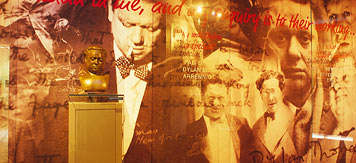


The Dylan Thomas Centre, Swansea



Our rich history and culture appear at every turn - you’ll spot them in our castles, our ancient language, the poetry of our artists, and the legends behind our mountains and rivers. You’ll see them, too, in new and re-imagined forms at Cardiff’s Millennium Centre, where opera meets break dancing and Shakespeare.
History
You can almost feel the past around you in today’s Wales: standing over a Roman amphitheatre, wandering among castle ruins in a sunny meadow or observing the stillness of a dark mine miles underground. The Welsh are descended from the tribal Celts who were both fearless warriors and gifted artists. But the Romans also mined for gold here, Normans built castles here and the Tudor dynasty was founded here. Each of the major periods of history has left its mark. Our excellent museums help put it all in perspective.
Language
Don’t worry - everyone speaks English in Wales! But you’ll also hear Welsh , one of Europe’s oldest and most lyrical languages. We’ve managed to maintain this Celtic language since the sixth century - a source of great national pride. Today, it’s a first language for many in the north and west, and all children learn it at school. In fact, Welsh-language education is becoming increasingly popular, as are Welsh-language TV, radio, and several newspapers.
Myths and Legends
We like a good story in Wales. You'll hear tales of King Arthur and Merlin the Magician, of kingdoms lost beneath the sea and battles between dragons, of haunted castles and knightly deeds. These captivating tales don't just spring from a fertile Celtic imagination - they are also inspired by our wonderful landscapes and seascapes. Which may explain why Pembrokeshire in West Wales is still proud to be known as “Gwlad hud a lledrith” - the land of magic and enchantment.
Music
Wales deserves to be called the “Land of Song.” Our music scene has never been more talented, diverse, or original. Along with perennial favorites Tom Jones, Shirley Bassey, and opera star Bryn Terfel, bands such as the Manic Street Preachers and the Super Furry Animals have an international following. Meanwhile, jazz fans have their choice of clubs and festivals - Brecon Jazz is one of the best in Europe.
On the classical front are the National Orchestra for Wales and the Welsh National Opera, which performs to a global audience. And of course, there’s the classic Welsh music institution: the Male Voice Choir. Go to a concert or arrange to visit a weekly rehearsal, where you’ll hear their world-renowned singing in a relaxed and informal environment.
Performances of all kinds are held at Cardiff’s stunning Millennium Centre.
Literature
The Welsh are known as a people of letters for good reason: we have a lot of poetry for such a small country! Dylan Thomas is probably our most famous writer, with Roald Dahl not far behind. But the tradition goes back to our lyrical 6th-century epic poetry - written in Welsh, of course! The “eisteddfod,” an annual cultural festival of literature music and song, is a Welsh institution begun in the 12th century. Each year, we eagerly watch - and listen - to see which bards will win the “chair,” and the “crown”, the competition is fierce. Try to catch it in August, or visit one of the local eisteddfodau taking place year-round. The world famous Hay Festival, a more recent invention, celebrates literature each year in Hay-on-Wye, known as the town of books and the second-hand book capital of the world. Even if you can’t catch a festival, you can always enjoy the work of some of our greats: Kate Roberts, Hedd Wyn, Jan Morris, Gwyneth Lewis, Dannie Abse and many more.
© Copyright 2005, 2006. All Rights Reserved.
